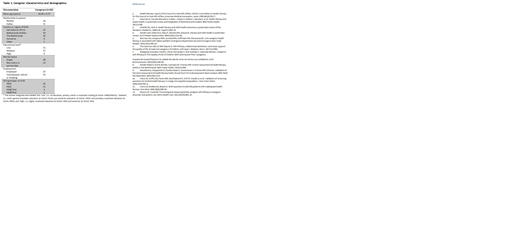Introduction
Sickle cell disease (SCD) is a hereditary red blood cell disorder characterized by severe anemia, acute and painful vaso-occlusive crises and progressive organ failure. Success of health management of children with SCD is highly contingent on caregivers' capabilities. Caregivers of SCD affected children must perform a variety of tasks including communication with healthcare providers, reading and understanding of health information, interpretation of acute symptoms and administration of medication and complex decision making with regard to treatment options. A construct which describes the knowledge and competences of persons to meet the complex demands of health is 'health literacy' (HL) (1, 2). The measurement and assessment of HL is of growing importance due to expected and reported relationships between inadequate HL and health outcomes (3-5). In addition, caregivers with higher HL levels feel more confident in their ability to perform caregiving tasks, e.g. have a higher self-efficacy, often associated with higher quality of life (6, 7). Information on literacy levels and the relationship between HL, disease knowledge and self-efficacy may guide interventions in comprehensive SCD care. The aims of this study were to: (a) gain insight into levels of HL in caregivers of children with SCD using objective and subjective measures and to (b) assess the relationship between HL, caregivers self-efficacy' in communication with healthcare professionals and knowledge of SCD on different topics related to the illness. This abstract reports preliminary results.
Methods
In this cross-sectional, observational study, we included caregivers of children with SCD who attended the outpatient clinic of the Sickle Cell Comprehensive Care Center in the Erasmus Medical Center for a routine follow-up visit. Caregivers included in the study had to be able to communicate verbally in Dutch with professionals. HL was measured using the Short Assessment of Health Literacy in Dutch (SAHL-D) (8, 9); self-reported HL was evaluated by the Set of Brief Screening Questions (SBSQ) (10, 11). Self-efficacy was measured using the Perceived Self-Efficacy in Caregiver-Patient Interactions (PECPI) scale (12). Knowledge of SCD was assessed using a structured 13-item questionnaire (SCD-K) based on information and education provided in our clinic. Since data were not-normally distributed, they were analyzed using non-parametric statistics.
Results
To date, a total of 42 caregivers were included. Study inclusion will continue until at least 75 caregivers have been included. Demographics are presented in Table 1. Caregivers were mainly the child's mother (81.0%) often the single head of household (66.7%). The mean age of caregivers was 34.4 years. Educational level ranged from never attended school to post college Almost a quarter (23.8%) of caregivers was born in the Netherlands, others the rest were non-western migrants (76.2%). 78.6% of caregivers had low HL according to the SAHL-D. Caregivers with lower HL were more likely to have lower education (p=0.012) and to have been born outside the Netherlands (p=0.002). Only four caregivers (9.5%) reported having difficulties in understanding and applying health information (measured by SBSQ). The correlation between the SAHL-D and the SBSQ scores was weak (r=0.39). Mean scores on the SBSQ and PECPI were high, indicating that caregivers perceived their abilities for self-efficacy and their ability to read and understand medical information as quite high. Responses to individual SCD-K items however suggest large knowledge deficits: only 64.3% of caregivers knew which temperature is considered as fever [>38.0 °C or >38.5 °C] and only 14.3% was aware which risk factors are able to provoke sickle cell crises. The relationship between literacy status and item responses on SCD-K assessment scale was also examined. Caregivers with low literacy scored significantly lower on almost every individual item.
Discussion
Inadequate HL is highly prevalent in caregivers of children with SCD. Not being born in the Netherlands and lower education levels are strong predictors of low HL. Our study suggests that healthcare professionals should be attentive to possible low HL. In addition, these results underline that health information should be tailored to the HL skills and specific context of patients and their families.
Cnossen:NWO: Other: Governmental grants , ZonMW, Innovation fund and Nationale Wetenschapsagenda 2018; Roche: Other: Travel Grants; Takeda: Other: Travel Grants, Research Funding; Shire: Other: Travel Grants, Research Funding; Baxter: Other: Travel Grants, Research Funding; Sobi: Research Funding; CSL Behring: Other: Travel Grants, Research Funding; Nordic Pharma: Research Funding; Novo Nordisk: Research Funding; Pfizer: Other: Travel Grants, Research Funding; Bayer: Other: Travel Grants, Research Funding.
Author notes
Asterisk with author names denotes non-ASH members.


This feature is available to Subscribers Only
Sign In or Create an Account Close Modal